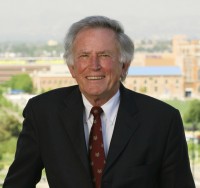Article By: Alex Pearlman

An energy box, a foreign policy box, an economics box. According to former Senator Gary Hart, these areas of policy of decades past were unrelated, individual issues, dealt with by Congressional committees, each focusing on their own, single box.
But Hart believes those days are over.
“The realities of the 21st century world have been shattering these boxes and merging these issues with massive force,” Hart wrote on his blog, “Matters of Principle”, last month. “I argue that, at the very least, we cannot separate consideration of and a search for solutions to energy, climate, and security.”
With the Copenhagen Climate Change Summit looming, those long involved in the environment and energy debate, like Hart, see an opportunity for the United States to be a key player in the negotiations and take on a leadership position in December. Hart perceives this as a likely move that would string the US energy policy, foreign policy and economic policy boxes together.
Hart, an early proponent of solar energy who served on the Senate’s Environment and Public Works committee, says that the US needs to take a stand at Copenhagen.
“The world is waiting for the United States. We all need to be concerned about this and involved in it.”
While there are a multiple drafts of treaties in circulation regarding global warming and climate change in anticipation of the summit, there are two competing drafts that are gathering steam, one backed by the United States and the other championed by China.
The latter document, which is essentially an update to the 1997 Kyoto Protocol agreement, which the US did not ratify, would require industrialized countries to severely cut down on carbon emissions, while transitioning countries like China and India, two of the biggest polluters, would not necessarily be held to the same standards or be required to show results in the near future.
“India, China, the developing nations and economies are going to take their cue from us,” said Hart, who believes that the United State’s position has the ability to affect a resolution to the on-going debate. “If we don’t go and take a very strong position, they won’t follow. It all depends on what position the United States takes and whether it provides a leadership position. We don’t yet know what the Obama administration’s policy is, in terms of what we’re doing here, domestically, but also what proposals we will put on the table in Copenhagen.”
In addition to the text of the document that comes out of the talks at Copenhagen, which will seek to regulate carbon emissions, the former Senator is concerned about the larger picture of global warming.
“The issue isn’t how you do it; the issue is what the agreed objective is,” he said, explaining that the problem is navigating change on a margin of less than six tenths of a degree, Celsius. “[The objective] is to prevent the global climate from exceeding two more degrees. About 1.4 degrees of that is not changeable, and we have to achieve the objective of reducing those emissions in 30 or 40 years to prevent a tipping point that can’t be reversed.”
Still, the most important thing that needs to happen at Copenhagen is for the United States and China to work together to negotiate a treaty that all parties can agree on and that will begin to regulate emissions, be a promoter of cleaner energy technologies in all countries, and provide assistance to those countries that cannot afford to enact change themselves.
And Hart is optimistic that the United States will take on the leadership role it is expected to at the talks.
“I’m very, very hopeful that our government, on our behalf, takes a very strong position.”
Printed with permission of www.globalpost.com












